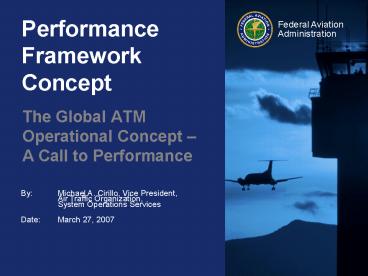Performance Framework Concept - PowerPoint PPT Presentation
1 / 15
Title: Performance Framework Concept
1
Performance Framework Concept
- The Global ATM Operational Concept A Call to
Performance
2
The Future
- Significant growth to 2025
- Global passengers, 4.2 to 9 billion
- Aircraft Movements to 173
- Higher regional growth
- Advanced avionics
- Longer range flights
- More aircraft classes
- Extended aircraft range
- Global aircraft resale market
- ? Accommodate growth in a seamless, globally
interoperable manner
?
3
The Challenge
0032 1210 1340 DELAYED 0115
1212 1350 DELAYED 5312 1215
1400 DELAYED 8714 1215 -----
CANCELD 0002 1217 1217 ON TIME 0452
1218 1520 DELAYED 0322 1220
----- CANCELD
- Disparate systems
- Rigid structures
- Limited collaboration
- Not best use of scarce resources
- Limited information exchange
- Advanced avionics capabilities underutilized
- Long lead times for system improvement
Address airline delays, group urges
Aviation Enters Global Warming Debate
High-Flying Airfares
4
The Global ATM Operational Concept
- Endorsed by 35th Session of the Assembly
- Vision
- Globally interoperable
- All users flight phases
- Safe, economic, environmental secure
- ATM user expectations are drivers for change,
requiring - Safety case
- Business case
- Foundation for ATM System Requirements
5
Global ATM Requirements
The Global ATM Operational Concept envisions a
system that is service oriented, performance
driven and predicated on the guiding principles
described in the OCD (Global Air Traffic
Management Operational Concept, Doc 9854). To
fulfill this vision, the ATM system shall a.
Ensure that performance forms the basis for all
ATM system development b. Treat performance as a
whole, that is, considering all the ATM community
expectations and their relationships
- Performance-based ATM is central
- What does this mean?
- Justify changes (operational improvements) to the
ATM system with their performance impact - Post-implementation monitoring
- Balance the multiple aspects of performance
- Guided by community expectations
6
ATM Community Expectations
- Access and Equity
- Capacity
- Cost-effectiveness
- Efficiency
- Environment
- Flexibility
- Global Interoperability
- Participation by the ATM Community
- Predictability
- Safety
- Security
Objectives
Indicators
7
Overview of Performance Process
- Expectations lead to targets
- Current performance is measured
- Future performance is estimated from forecasts
- Performance gaps are addressed via additional
operational improvements - Performance is monitored
- Plan is adjusted
- ? More detail in subsequent talk
8
Level of Consistency
- Variations in expectations actual performance
- Across time
- Location
- ATM community member
- System is tailored to best meet needs of
individual locations at specific times - Harmonized on
- Consistent definitions
- Measurement, data, and estimation
- Consistent performance approach
It is critical that the metrics be applied
uniformly across the total system, i.e. that in a
series of linked systems (regions, homogenous
areas, etc.) they will be the same, while the
actual required level of performance may be
variable. (From Doc. 9854)
9
Need for Consistent Framework
Global Interoperability Goal
- End-to-end performance
- Benchmarking
- Best Practices
- Accountability
- Consistent requirements
- Service Delivery
10
Performance Hierarchy
- Initially defined in Global ATM Operational
Concept - Layers represent different views of the ATM
system - Allows tracing of performance impact
- Changes at lower levels impact next layer above
- Leads to expectations
- Helps understand and communicate performance case
11
Level 2 - Expectations
- Expectations 11 ATM Community Expectations
- Outcomes of the ATM system
- Required ATM System Performance (RASP)
- The collection of targets within all 11 KPA
- Function of time as targets evolve
- Actual ATM System Performance
- Measured through indicators within 11 KPA
12
Level 3 ATM Component Functionality
- Internal performance of ATM system
- What functions/services does the ATM System
perform? - How do these deliver the outcome?
- Performance-case
- Service-level impact
- Traceable
- RTSP
Level 1 Political and Socio-Economic Requirements
Level 2 Expectations - RASP
Level 3 ATM Component Functionality - RTSP
Level 4 System Requirements (e.g., RNP, RCP)
Level 5 Technologies (incl. standards,
specifications)
13
Levels 4/5 System Requirements Technology
Level 1 Political and Socio-Economic Requirements
- Decomposition of ATM System
- What system performance is required to deliver a
level of service? - Technologies
- Systems implement technology
- Focus on shared technology
- Must include functionality
Level 2 Expectations - RASP
Level 3 ATM Component Functionality - RTSP
Level 4 System Requirements (e.g., RNP, RCP)
Level 5 Technologies (incl. standards,
specifications)
14
Putting it Together
- Provides a consistent structure based on type of
improvement - Trace improvements up the hierarchy
- Tool for accountability
- Post-implementation measurement across levels
People Procedures Infrastructure
System Design
Technology
15
The Future is Performance-based































